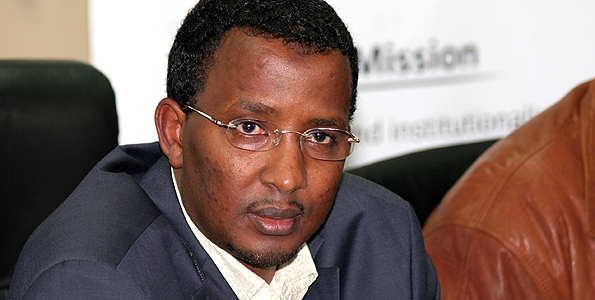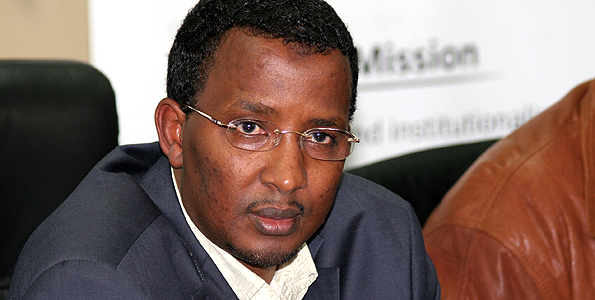None of the four companies listed as the most qualified in the Sh3.9 billion Biometric Voter Registration (BVR) tender met the standards set by the electoral commission for the supply of 9,700 voter registration kits.
A confidential evaluation report by the Independent Electoral and Boundaries Commission (IEBC) seen by the Nation showed that an evaluation team had expressed reservations about some of the vendors and the quality of their goods.
Four companies — 4G Identity Solutions, Symphony, Face Technology and On Track Innovations — had emerged as the top contenders for the tender.
On Sunday, IEBC chairman Ahmed Issack Hassan said a due diligence report on Symphony is expected on Monday next week.
Mr Hassan spoke to the Nation by phone from London.
Under the BVR system, sophisticated scanners are used to take facial images and fingerprints of the voter, which are stored in a central computer. On voting day, the machine identifies you by comparing your unique features with the ones earlier stored.
The system makes rigging of elections difficult by eliminating impersonation and multiple voting.
The first confidential evaluation shows how 18 companies were disqualified at the preliminary level for being non-responsive, while eight others that qualified for evaluation were eliminated allegedly on merit for reasons determined by the evaluation team.
The evaluation committee, chaired by Ms Decima M’mayi, indicated that the picture quality features in the proposal presented by Symphony were not good enough.
“The fingerprint quality check was inadequate, the webcam (special digital camera) did not meet the flexible and independent mount standard required as per tender document,” the report further states.
Ms Mmayi’s team further ruled that apart from being inexperienced in the area of BVR, Symphony failed to demonstrate where power for its machines would come from.
Identifying fingerprints
Symphony, however, scored highly on the machines for identifying fingerprints, with the report noting that their demonstration was convincing and the strongest.
The committee also had doubts about the quality of the webcam provided by 4G Identities, arguing that it was below the standard required.
The company was also fighting to clear itself of allegations that it had been blacklisted in India. Neither did it have wide experience in BVR.
“4G identity solutions did not come out strongly in demonstrating the capacity to provide field support,” states the report.
Only Face Technologies from South Africa, ranked fourth in the report, is commended for its experience in BVR, but like the others, its camera was found to be sub-standard and its proposal for power especially in areas without electricity was also questioned.
“Face Technologies were non-committal on the solar solution that they are to provide which is a high risk to the commission,” warned the team.
The evaluation team also sunk the chances of On Track Innovations from Israel winning the tender, questioning their quotation of Sh8 billion and a BVR kit that was not properly integrated.
The company also failed the weight test, proposing kits weighing 17kg against the required 15kg.
Two weeks ago, the commission settled for Symphony and ordered another evaluation to establish its ability to supply the kits. The decision drew protests from the other bidders, amid claims of bribery.
Some of the companies knocked out at the evaluation stage were Dan Office IT, which quoted Sh3.6 billion, Lithotech (Sh3.4 billion), SGS Societe Generale De Surveillance S.A. (Sh3.8 billion), Haier Electrical Appliances Corporation (Sh3.4 billion) and Muhibauer High International (Sh5.6 billion).
Meanwhile, civil society groups have asked the IEBC to tender for the voter kits afresh.
The executive director of the African Centre for Open governance, Ms Gladwel Otieno, said Kenyans would lose faith in the IEBC if it did not act on the anomalies raised.

